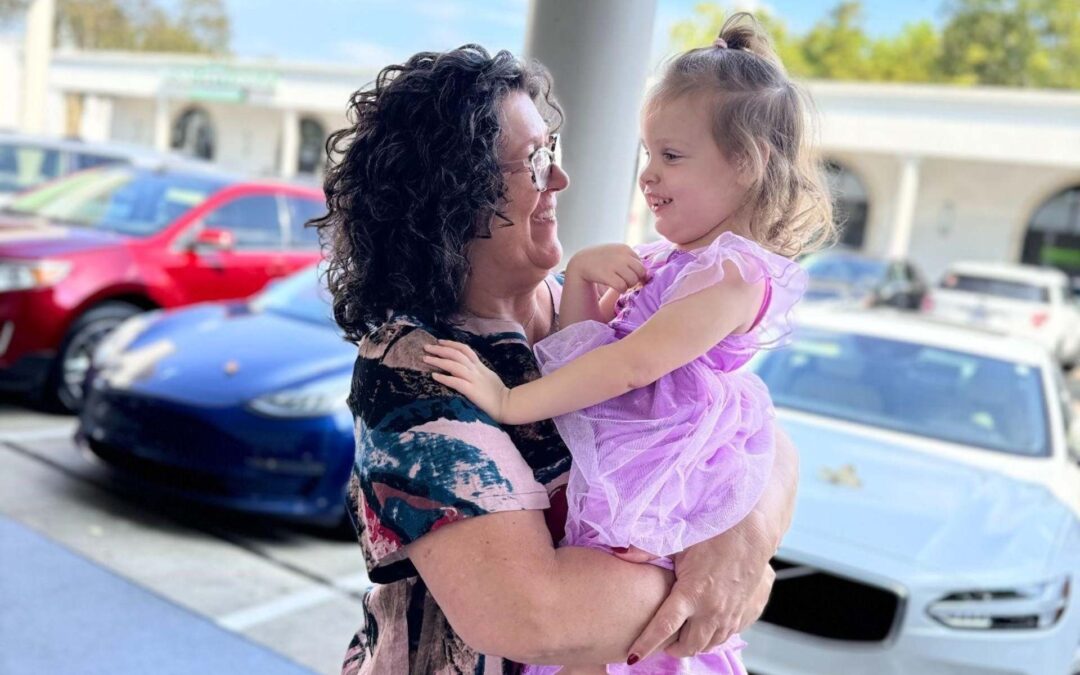I didn’t get it at first.
When I brought my daughter Freya home from the hospital, I was 28, freshly cracked open by childbirth—physically, emotionally, existentially—and completely overwhelmed. They handed me this tiny human and a hospital-grade squirt bottle and said, “Good luck!”
The truth is, I wasn’t okay. My brain was a foggy soup of hormones and fear. I was anxious, raw, convinced I was doing everything wrong. I remember staring at her while she slept thinking, How do people just… do this?
And so, I did the only thing I could think to do: I called my mama.
She showed up immediately. No dramatics, no long speech. She just came. She held the baby, folded laundry, made grilled cheese, and looked at me like I was still her baby too.
At the time, I didn’t fully grasp what it meant. I just knew I needed her. I needed someone who wouldn’t flinch at my tears or judge my sleepless ramblings. Someone who knew how to be solid when I felt like I was unraveling.
It’s only now—years later, with the toddler tantrums behind us and the big kid questions starting to roll in—that I really, really get it.
I get what it means to keep showing up even when you’re exhausted. I get what it means to worry yourself sick about fevers and feelings. I get what it means to carry this invisible, constant mental checklist that never turns off.
I see it now, Mama.
You were just a person, trying to figure it out. You had my brother at 21—a baby raising a baby—and then had me at 30, probably thinking, Okay, round two, let’s see if I can do this without crying in the pantry.
I used to think you always knew what you were doing. Now I know you were just doing. You were just loving us with everything you had, even when it didn’t look picture-perfect. Even when we couldn’t see it.
Motherhood is a slow reveal. You don’t understand it all at once—it unfolds with each scraped knee, each “Can I do it myself?”, each night you lay in bed wondering if you did enough that day.
You look back and realize: Oh, this is what she felt.
You realize that when you screamed, “You don’t understand!” at thirteen, she probably wanted to scream back, I understand more than you’ll ever know.
Now I do.
Because now, I get the kind of tired that’s not just about sleep—it’s about being needed constantly. The kind of tired that lives in your bones, that makes you forget words mid-sentence and cry when there’s no more ketchup.
I get the joy too. The fierce, ridiculous joy that bubbles up when your kid says something magical like, “I love you more than the moon’s freckles.” The joy that punches you in the chest when they laugh, or when they reach for your hand without thinking.
I get the guilt. The “did I yell too much today?” spiral. The “I should’ve been more present” ache.
And I get the love.
The enormous, humbling, sometimes terrifying love that grows every single day. The kind that changes who you are and what matters. The kind that makes you want to freeze time and rush it forward all at once.
Freya is her own little person now. She’s stretching into the world—braver, sillier, more opinionated by the minute. And as she grows, I feel the pull. That slow stretch away from me. The sacred ache of loving someone so much you start preparing them to leave you.
And I know—that’s the job.
We grow them. We guide them. And then we let them go. Bit by bit, we give them back to the world.
I didn’t understand how hard that part would be.
And honestly? I didn’t understand you until I had her.
I didn’t understand what it cost to make things look effortless. To be the glue. To sacrifice and hold and show up without being asked. I didn’t understand what it meant to be the one holding the pieces when everything falls apart—because now, I’m the one doing that too.
And yet, I also know that not everyone gets the version of motherhood I had. I’m a therapist—I hold space for stories where “mom” wasn’t safe, wasn’t nurturing, wasn’t love. For those who set boundaries or walk away completely, that’s sacred work, too. That’s survival. That’s healing.
“Doing their best” doesn’t excuse harm.
But in my story? That phrase hits me differently now. Because I look back and see my mama’s best everywhere—quiet, messy, soft, and powerful.
She didn’t get everything right. Neither will I. But what I know now, deep in my bones, is that love doesn’t have to be perfect to be enough.
So this is for her.
And for me.
And for every mom who’s ever looked at their child and felt completely unqualified, but still showed up anyway.
It took me years to understand it. But now I know.
Now I really know.
And someday, maybe Freya will be 32, holding her own baby, calling me in the middle of the night just to say, “I get it now.”
And I’ll say what my mama said to me:
“You’re doing great.”
Even if you’re not sure you are.
Even if it feels like you’re messing everything up.
Even if you’re crying over spilled milk—literally or metaphorically.
You’re doing great.
And one day, it’ll all make sense.

